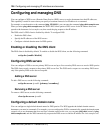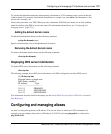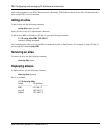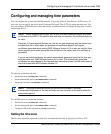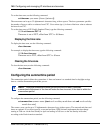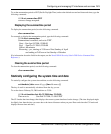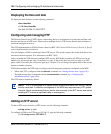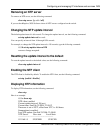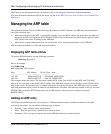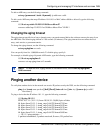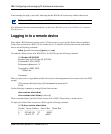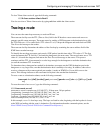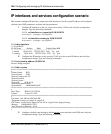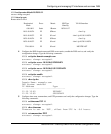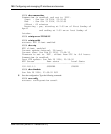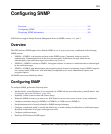
144 Configuring and managing IP interfaces and services
NN47250-500 (320657-F Version 02.01)
The Timezone and Summertime fields are displayed only if you change the timezone or enable summertime.
(For more information about the fields in the output, see the Nortel WLAN Security Switch 2300 Series Command Line
Reference.)
Managing the ARP table
The Address Resolution Protocol (ARP) table maps IP addresses to MAC addresses. An ARP entry enters the table in
one of the following ways:
• Added automatically by the WSS. A switch adds an entry for its own MAC address and adds entries for addresses
learned from traffic received by the WSS. When the WSS receives an IP packet, the switch adds the packet’s source
MAC address and source IP address to the ARP table.
• Added by the system administrator. You can add dynamic, static, and permanent entries to the ARP table.
ARP is enabled by default on a WSS and cannot be disabled.
Displaying ARP table entries
To display ARP table entries, use the following command:
show arp [ip-addr]
Here is an example:
WSS# show arp
ARP aging time: 1200 seconds
Host HW Address VLAN Type State
------------------------------ ----------------- ----- ------- --------
10.5.4.51 00:0b:0e:02:76:f5 1 DYNAMIC RESOLVED
10.5.4.53 00:0b:0e:02:76:f7 1 LOCAL RESOLVED
This example shows two entries. The local entry (with LOCAL in the Type field) is for the WSS itself. The MAC
address of the local entry is the switch’s MAC address. The ARP table contains one local entry for each VLAN config-
ured on the switch. The dynamic entry is learned from traffic received by the switch. The ARP table can also contain
static and permanent entries, which are added by an administrator. The State field indicates whether an entry is resolved
(RESOLVED) or whether WSS Software has sent an ARP request for the entry and is waiting for the reply
(RESOLVING).
Adding an ARP entry
WSS Software automatically adds a local entry for a WSS and dynamic entries for addresses learned from traffic
received by the switch. You can add the following types of entries:
• Dynamic—Ages out based on the aging timeout.
• Static—Does not age out but is removed by a software reboot.
• Permanent—Does not age out and remains in the ARP table following a software reboot.



